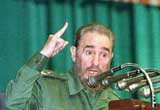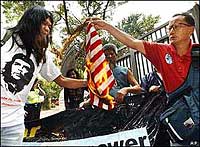
Ant's Military Notes HOME | EMAIL
Cuba's interference in Africa.
Cuba's interference in Latin America.
Fidel Castro.
Che Geuvara
Cuba's interference in the Middle East.

Cuba's interference in Africa.
![]() Castro's 1977 southern Africa tour.
Castro's 1977 southern Africa tour.
"In Africa we can inflict a severe defeat on the entire reactionary imperialist policy. We can free Africa from the influence of the U.S.A. and of the Chinese."
Excerpt from the conversation between Comrade Erich Honecker and Comrade Fidel Castro on April 3, 1977.
Read the transcript of Castro's 1977 southern Africa tour: A report to Honecker.
![]() Castro explains Cuba's withdrawal from Angola.
Castro explains Cuba's withdrawal from Angola.
According to the fashionable view, Pretoria agreed to withdraw from Angola and Namibia with its tail between its legs, a spent force. In other words, sanctions and Fidel Castro won the day. This is not the analysis that emerges from Castro’s own version of events in his speech to the Cuban Council of State on July 9, when it met to confirm the death sentence imposed on General Arnaldo Ochoa Sanchez, chief of the Cuban military mission in Angola from November 1987 to January 1989. Read the report from Paratus magazine.
It's 2005, the Cold War is over and we still have sanctions on Cuba?
It sounds crazy that Cuba is subject to economic sanctions, however Fidel Castro has not abandoned the Socialist dream! He still travels the world (wherever they will receive him) and makes thunderous speeches and hugs world leaders. Cuba's economy is presented as a shining example of socialism, however, Castro does not have the resources (in terms of arms and money) to influence governments. Unfortunately, this policy impacts the poor citizens of Cuba. Maybe when Fidel dies and the Socialist hammer is put down, the highly educated (but jobless) Cubans will be able to use their skills to build their economy and join the rest of the world.
However, I am worried about his latest partnering with Hugo Chavez (an avowed Communist) of Venezuela. Venezuela has oil (and therefore finances ) to help Fidel destabilise and influence South America. Read the transcript of Castro's comments on progress in Latin America.
![]() Castro explains Cuba's involvement in Latin America.
Castro explains Cuba's involvement in Latin America.
How USA and China's interference stifled the spread of "Socialism".
Fidel Castro.
Born into a large, prosperous Cuban farming family in Mayari, near Brian, Cuba, on August 13, 1926 or 1927, Castro attended Jesuit schools and later studied law in Havana. During his student years, he was a political activist. Upon receiving his degree in 1950, he established a private law practice and joined the reformist Cuban People's Party. In 1952 he planned to run for a parliamentary seat. However, Gen. Batista overthrew the government and canceled the election. Castro first challenged the Batista regime in court, but in 1953 organized an unsuccessful rebel force. Castro was arrested, tried and put in jail until 1955. He next went to Mexico to organize a new force, one that became known as the 26 of July Movement. In 1956 this group launched its attack, again meeting a bloody defeat. Castro and his followers next began a guerrilla war against the corrupt and by now very unpopular Batista regime. They quickly built a large following, also thanks to an effective propaganda campaign. On January 1, 1959, Castro triumphantly took power.

Having received widespread support from numerous Cubans because of his promises to restore the 1940 constitution, pursue a moderate program and respect civil liberties, Castro quickly disappointed many sympathizers with his radical policies after 1960. It turned out that the Cuban revolution involved a far-reaching transformation of Cuban society led by the state, which, for its part, was dominated by the communist party. The hostility of the United States could be taken for granted virtually from the start. Washington, under President Eisenhower, had already resolved to bring the Castro regime down, if necessary by violence. Disinclined to work with the Americans and in the face of U.S. hostility, Castro quickly intensified his cooperation with the Soviet Union. Cuban-U.S. relations deteriorated further when John Kennedy entered the White House, and they reached a crisis point with the CIA-sponsored Bay of Pigs invasion by Cuban exiles in April 1961. This event contributed heavily to the Soviet decision the following year to station nuclear missiles in Cuba. The Cuban Missile Crisis, during which Castro's influence was very limited, brought the world as close to the brink of nuclear war as it has ever been.
Castro remained fairly popular in Cuba. Many Cubans seemed to benefit from the redistribution, education and health policies of his regime. Those who opposed Castro often tried to flee the country for the United States before the regime could arrest them. Although Castro has never held an open election, many scholars argue that during the early years of his regime, he could have won one. Internationally, Cuba was solidly in the Soviet camp, also receiving considerable economic support from Moscow. During the 1970s Castro sent his own military intervention force to civil war-ridden Angola to support the communist side. The end of Soviet aid after 1991 has exposed the weaknesses of the Castro system, causing the regime to initiate some cautious reforms.
Che Guevara.
Dr Ernesto Rafael Guevara de la Serna (June 14, 1928¹ to October 9, 1967), commonly known as Che Guevara, was an Argentine-born Marxist revolutionary and Cuban guerrilla leader. Guevara was a member of Fidel Castro's "26th of July Movement", which seized power in Cuba in 1959. After serving various important posts in the new government, Guevara left Cuba in 1966 with the hope of fomenting revolutions in other countries, first in the Democratic Republic of the Congo and later in Bolivia, where he was captured in a CIA-organized military operation. Some believe that the CIA wanted to keep him alive for interrogation but he was executed by the Bolivian army, although this is disputed. After his death, Guevara became a hero of Third World socialist revolutionary movements, as a theorist and tactician of asymmetric warfare.

Congo. He persuaded Castro to back him in the first covert Cuban involvement in Africa. Guevara desired to first work with the pro-Lumumba, Marxist Simba movement in the former Belgian Congo (later Zaire and currently the Democratic Republic of the Congo).
In 1964, Guevara was assisted for a time in the former Belgian Congo by guerrilla leader Laurent-Désiré Kabila, who helped Lumumba supporters lead a revolt that was eventually suppressed in 1965 by the Congolese army as well as the Chinese People's Liberation Army. Guevara dismissed Kabila as insignificant. "Nothing leads me to believe he is the man of the hour," Guevara wrote.
Guevara was only 35 at that time and had never had any formal military training. His asthma prevented him from going in to military service in Argentina, a fact of which he was proud, given his opposition to the government. He had the experiences of the Cuban revolution, including his successful march on Santa Clara, Cuba, in late 1958, which was central to Batista finally being overthrown by Castro's forces. However, as Guevara was to discover, working under the direction of a gifted revolutionary leader does not make oneself a gifted revolutionary leader.

U.S. Army Special Forces advisors working with the Congolese army were able to monitor Guevara's communications, arrange to ambush the rebels and the Cubans whenever they attempted to attack, and interdict Guevara's supply lines. Guevara proved unable to supplant the native Simba leadership, and in fact was forced to place his troops under Simba command. Later that same year, ill, humiliated and with only a few survivors of the force he had brought into the country, Guevara left the Congo. It seems that Fidel never forgot Che's incomplete mission, to central Africa and so he was happy to step in to help Angola's communist leader Neto defeat UNITA (Chinese supported by the neighboring country, the DRC or the Democratic Republic of Congo.)
61 Mech motto: "Mobilitate Vincere" - Destruction of the enemy through mobility.
